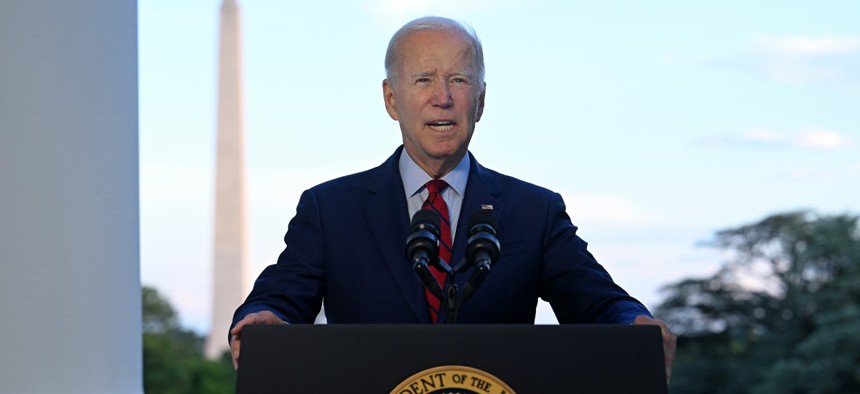
“Too much of small business relief funding, which was passed by the Congress, ended up in the hands of those who either didn’t need it or criminal syndicates who outright stole the money,” Biden said. Jim Watson-Pool/Getty Images
Biden Has Signed Bipartisan Legislation to Better Combat Fraud in COVID Relief Programs Into Law
The Pandemic Response Accountability Committee championed the legislation.
President Biden enacted bipartisan legislation on Friday to give prosecutors more time to go after fraudsters in COVID-19 programs for small businesses.
The legislation extends the statute of limitations for Paycheck Protection Program and Economic Injury Disaster Loan fraud from 5 to 10 years. Both programs have been subject to much fraud and the Small Business Administration's watchdog has been continuously updating the agency on how to better manage them.
“Too much of small business relief funding, which was passed by the Congress, ended up in the hands of those who either didn’t need it or criminal syndicates who outright stole the money,” said the president at a signing ceremony. “Today I’m signing two bipartisan bills that will give federal and local prosecutors more time to hold criminals accountable for defrauding the American people during a once in a century pandemic.”
Biden also took shots at the previous administration, saying that not only did “the Trump administration let the biggest businesses with the teams of lawyers and accountants skip to the front of the line, my predecessor undermined the watchdogs who were supposed to be on the job to make sure relief went to mom-and-pop businesses who were supposed to get it in the first place.”
He repeated his line from his State of the Union address on March 1 that “the watchdogs are back,” and noted that the Justice Department now has a chief prosecutor for pandemic fraud: Kevin Chambers.
“Anyone who defrauded these critical relief programs must be held accountable,” said Rep. Nydia Velázquez, D-N.Y., chair of the House Small Business Committee, who brought forth the legislation with Rep. Blaine Luetkemeyer, R-Mo., ranking member on the committee. “These bipartisan bills will ensure law enforcement agencies have the time they need to bring fraudsters to justice.”
Luetkemeyer said in a statement: “I am always pleased when bipartisanship leads to sound and responsible policymaking,” as this legislation “will hold these fraudsters accountable.”
Michael Horowitz, chair of the Pandemic Response Accountability Committee, who also serves as the Justice Department inspector general, said in a statement on Tuesday, “enactment of these laws will allow our investigators more time to pursue those who defrauded programs intended to assist small business owners and their employees during a national crisis.”
He also called for the Senate to pass another bipartisan bill that would “help [IGs] recover stolen tax dollars for taxpayers by raising the jurisdictional limit for administrative recoveries of ‘smaller’ false or fraudulent claims against the government from $150,000 to $1 million,” the committee said in the statement. “To date, the [committee] is aware of more than one million pandemic relief awards worth $362 billion, that ranged from $150,000 to $1 million. While the scope of the fraud for these ‘smaller’ awards has not yet been fully determined, the legislation would ensure that investigators could pursue them regardless of the dollar amounts involved.”
The committee is one of several entities working on COVID-19 oversight, which include the Special Inspector General for Pandemic Recovery and other IG offices, Congressional Oversight Commission, Government Accountability Office and Justice Department.
Government Executive spoke with the Small Business Administration IG last month about his office’s evolution of oversight of the small business relief programs and his work with the other entities. IG Hannibal “Mike” Ware said “it's certainly not black and white” when it comes to how one administration versus the next handled the programs.
Also, Ware said his office was working on a report on exactly where the fraud mark is so far, “but I could tell you this, what we did report before is $87 billion in potential fraud for the [Economic Injury Disaster Loan program]. And I can't remember what the exact figure was [for the Paycheck Protection Program]; it’s somewhere between $6 billion and $9 billion that we reported and so those things we stand by based on what our data analytics have demonstrated.” At the time, the office had “pulled back over $4 billion in terms of seizures.”







